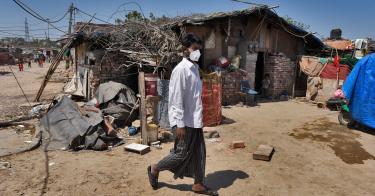Upwards of 900,000 Burmese Rohingya live in the world’s largest refugee camp in Cox’s Bazar, Bangladesh. The situation there was already dire. Then, on March 24, the city registered its first case of COVID-19. An epidemic in Cox’s Bazar could be catastrophic.
Rohingya refugees have endured tremendous brutality at the hands of the Burmese military. In August 2017, the military’s violent actions resulted in at least 10,000 deaths, the wide-scale rape and sexual abuse of women and girls, and other atrocities. The United Nations believes these attacks may constitute genocide.
Now, more hardship for the Rohingya looms on the horizon.
In refugee camps, social distancing is a literal impossibility, and access to medical care is limited. Clean water is scarce, making sanitation difficult at best. The Rohingya are, essentially, sitting ducks for the potentially deadly virus.
To make matters worse, the Bangladesh government, which has been largely hospitable to the refugees, has restricted their access to the internet and confiscated SIM cards, therefore limiting access to information about the disease.
International humanitarian assessments suggest that the mortality rate in Cox’s Bazar will be higher than global averages. Johns Hopkins Center for Humanitarian Health is “urg[ing] governments to prepare for the worst possible scenario after scientific modelling shows estimated infections would range from 119-504 in the first 30 days after an initial case, and between 424,798 and 543,647 in 12 months.”
For years, the U.S. has tried to ease the refugees’ plight, providing approximately $820 million in assistance since August 2017. With the emergence of COVID-19, the U.S. has also made an effort to prioritize assistance to vulnerable populations in need of an increasing amount of humanitarian assistance. Secretary Pompeo announced an infusion of $274 million worldwide in emergency funding.
Even this level of assistance will barely make a dent in growing humanitarian needs. In March, the UN issued a global call for $2 billion in assistance to protect the most world’s most vulnerable, and the UN Refugee Agency (UNHCR) called for $255 million to assist the more than 25 million refugees around the globe. More assistance will be needed as the crisis continues to unfold.
As other countries around the globe battle their own domestic outbreaks of the coronavirus, attentions are turning inward. This change in disposition has the potential to leave already-vulnerable populations, like the Rohingya, in an even more precarious position.
The situation demands U.S. leadership.
To harness the needed humanitarian assistance, the Trump administration should do what it has put off for far too long and issue a determination on atrocity crimes committed against Rohingya.
An atrocity determination from the U.S. carries great gravitas. It would shine a spotlight on the severity of the crimes Rohingya have already endured and attract global attention to their worsening plight in the midst of the coronavirus pandemic. Given the momentum building for a global response to COVID-19, it may prove a fruitful moment to bring together a coalition of the willing to share the burden of providing assistance that a refugee crisis of this scale merits.
It also aligns with current U.S. policy priorities in Asia, as outlined in the free and open Indo-Pacific strategy, which according to Vice President Mike Pence, prioritizes “support [for] transparent and responsive government, the rule of law and the protection of individual rights.” More specifically, a determination comports with U.S. policy toward Burma, where the U.S. has already imposed financial sanctions against architect of the atrocities, Senior-General Min Aung Hlaing, and other senior Burmese military officials involved in carrying out the crimes.
In the face of COVID-19, countries are asking what is possible. Issuing an atrocity determination is just that. The Secretary of State can literally issue a determination at any point in time. In the case of the Rohingya, it should be easily accomplished because a report commissioned by the State Department has already found reasonable grounds to conclude that genocide and crimes against humanity took place.
The administration should issue a determination soon if it hopes to have partners in providing for the vast and ever-increasing needs of the nearly 1 million displaced Rohingya during COVID-19.
This piece originally appeared in Forbes https://www.forbes.com/sites/oliviaenos/2020/04/14/why-the-pandemic-is-the-right-time-to-issue-an-atrocity-determination-for-rohingya/#2da406fe3964



